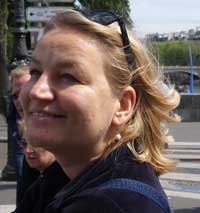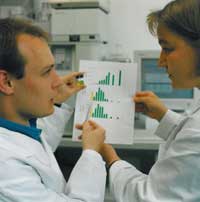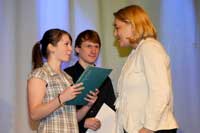Sowing the seeds of science: Helke Hillebrand Inspire article
Helke Hillebrand has always been fascinated by science, but on the back of a career in plant biology, her urge to work more closely with people helped her decide to go into tending young minds instead of new shoots. Vienna Leigh reports.

Image courtesy of Rüdiger Hell
It seemed a given that the young Helke Hillebrand would go into science. “I fell in love with biology in ninth grade,” says the woman who oversees about 200 PhD students at the European Molecular Biology Laboratory (EMBLw1), all of whom trust her as an advisor, listener, problem-solver and friend. “I very much appreciated in science that there was no end to asking ‘Why?’ and ‘How does it work?’ – and how astonishing our whole world is if one comes to think of it as a constantly evolving system rather than something ‘given’.”
From there, it was a short hop into plant biology, which also offered something else that Helke, who grew up in the small town of Velbert, close to Essen, Germany, was interested in: a social aspect. “I was amazed by plants’ astonishing biochemical capabilities, and from there I discovered an interest in biotechnology and agriculture, with a specific emphasis on food, nutrition and the co-evolution of the history of mankind with agricultural progress,” she says. “After my PhD I worked as an assistant professor (akademische Rätin) for some time at the university. Then I joined BASF Plant Sciencew2 [a section of the world’s largest chemical company] in Ludwigshafen, Germany, as a senior scientist, where I built up my own group and ran research projects to develop a ‘tool kit’ for plant genetic engineering. I especially liked to get into very basic science deeply but at the same time to have the opportunity to develop a broad overview of agricultural requirements.”
Before long, Helke had become the head of the ‘enabling technologies’ division, switching from her own research activities into technology management. “My work had a very broad strategy – to serve current needs as much as developing a vision on future applications and cutting-edge technology,” she explains. “I enjoyed striving for expertise and excellence on a broader level in one of my favourite research areas: understanding how cells get to ‘know’ what to do when, and how this communication flow is triggered on a biochemical level inside a cell, a tissue or a whole organism.”

results with a colleague at BASF
Image courtesy of BASF
However, there was one thing that Helke was still missing as a research scientist. “I very much enjoy working with people,” she says. “When I was running research labs I enjoyed having good and close colleagues who turned into dear friends – we had common goals and common targets to meet, and we pursued them by supporting each other – but I often felt that I was missing out a little on really engaging with many different types of people.”
To combat this, Helke got involved with as many outreach and teaching opportunities as possible. “The biggest reward is to see a student’s face glowing with interest for the topic or seeing one of the less interested ones becoming enthusiastic,” she says. “It is great to see talent flourish and to help that process. I especially like explaining complex scientific stories to the public.
“During my last two years at BASF I took on a position as a financial spokesperson with the investor relations department. I also acted as the main contact for investors in Asia and very much enjoyed the contact with people, especially with Japanese professionals, who have a fascinating business culture.”
So, when an opportunity at EMBL came up, Helke jumped at the chance. “In my position as the dean of graduate studies, I look after all aspects of EMBL’s PhD programme, which takes about 50 students from all over the world every year,” she explains. “In addition to the administrative and ‘business’ side, my role here is to act as a mentor and confidant. I have an open-door policy towards EMBL students, who may turn to me with academic or personal problems.
“I’m also very active as part of the ‘external face’ of EMBL, building alliances and establishing partnerships with universities towards the awarding of joint PhD degrees, promoting the PhD programmew3 at conferences, and so on.”

prize at Jugend Forscht 2010
Image courtesy of BASF
With this, Helke has found the perfect mix of science and people skills. “I’d never thought before about turning what I had always enjoyed as a side activity into my profession; in fact I’d never even realised that this might be possible,” she says. “What matters most to me is to be able to contribute to the significance or importance of something I believe in. Situations in which commitment counts, where mutual help is appreciated, where people listen to each other and where team success matters are important to me.
Even as a researcher I always kept ties with things I liked doing a lot – like mentoring, especially for young or future female researchers, teaching and interviewing students for fellowships – even though it was far away from my professional scientific assignment.” For example, since 2005, Helke has been a judge for the biology-related submissions to Jugend Forschtw4, the German young scientist contest for students up to the age of 21.
Helke may have chosen to move away from research, but those who stay at the bench can also find their jobs evolving into something that requires a great deal of understanding, diplomacy and a knack for communication. “One of the most challenging aspects of a scientific career is the point where one has to turn from being ‘just’ an excellent researcher at the bench into a team leader guiding a group of people who will invest a period of their lives and careers into your research ideas,” she says. “All of a sudden – often without any training – researchers need to turn into teachers, supervisors, managers, fundraisers – and all at once. True excellence in science requires a lot of people skills, and it’s clear that teachers, universities, institutes and government initiatives should be aware that these skills can and should be learned and trained and could be continuously improved.
Web References
- w1 – To learn more about EMBL, the European Molecular Biology Laboratory, see: www.embl.org
- w2 – Find out more about the plant science section of BASF here: www.basf.com/group/corporate/en/products-and-industries/biotechnology/plant-biotechnology
- w3 – You can find more information on EMBL’s international PhD programme here: www.embl.de/training/eipp
- w4 – To learn more about Jugend Forscht, the German young scientist contest, see: www.jugend-forscht.de
- The winners of Jugend Forscht participate in the European Union Contest for Young Scientists. See:Rau M (2009) Discoveries in Paris: the European Union Contest for Young Scientists. Science in School 13: 6-9.
Institutions
Review
This article clearly shows the importance of grabbing students’ interest in science from an early age. Once students are hooked on a subject, it is not easy to lure them into other fields. Although studying science may be tough, the article clearly shows that it is still worthwhile, as a science degree opens up numerous avenues for further study and career prospects. The article also shows that scientists are only human, with the same traits and characteristics we might experience in ourselves, including the need to be and work with other people.
The article is suitable for students aged 13 and above, mainly in biology classes, but may also be used for integrated / coordinated science, or with any science students as a model of career prospects or to discuss the (supposed) characteristics of scientists.
Paul Xuereb, Malta
